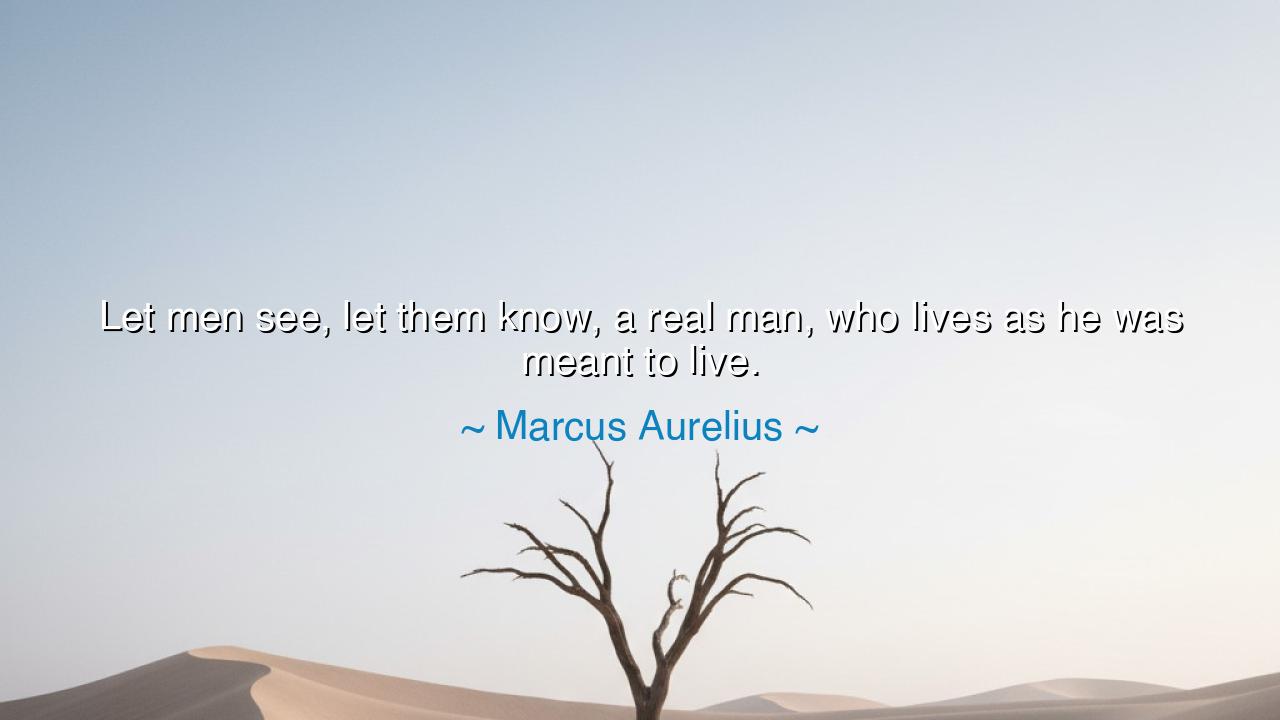
Let men see, let them know, a real man, who lives as he was meant






Hear the words of Marcus Aurelius, philosopher and emperor, who bore the weight of Rome upon his shoulders and yet carried within him the voice of wisdom: “Let men see, let them know, a real man, who lives as he was meant to live.” This is no boast, no call to vanity, but a command of the soul to itself—a summons to embody virtue so fully that others may witness in you the pattern of a life well lived. It is a call to authenticity, to integrity, to the pursuit of a higher life, not hidden in secrecy but shining before the eyes of all.
The origin of this saying lies in Marcus’s Meditations, those private writings where he spoke to himself with the sternness of a teacher and the tenderness of a father. He knew that the world is filled with false images of manhood: power mistaken for greatness, indulgence mistaken for freedom, arrogance mistaken for strength. Against these illusions he set the Stoic ideal: that a real man is one who lives according to reason, nature, and virtue. Such a man does not perform for applause, but his very way of life becomes a lesson to those who see.
Consider the life of Cincinnatus, the Roman farmer who was summoned to serve as dictator in a time of crisis. He accepted the burden, defeated Rome’s enemies, and then, instead of seizing glory, returned humbly to his plow. Here was a man who lived as he was meant to live—with duty, humility, and balance. Men saw in him an example, not of ambition, but of integrity. His story endured not because he spoke of greatness, but because he embodied it. This is what Marcus Aurelius meant: to let life itself, not words, be the testimony of one’s character.
The power of Marcus’s command is that it is outward-facing. To live rightly is not only a private affair—it is also to stand as an example to others. The Stoics believed that each life is bound to the whole of humanity, that your actions ripple outward, touching unseen lives. Thus, to live as you were meant is not only for your own peace of soul, but so that others, in seeing you, may find courage to do likewise. Your life becomes a torch in the dark, a pattern for others to trace.
Yet Marcus also reminds us that such a life is not easy. It requires vigilance against corruption, resistance to temptation, and the strength to endure hardship without complaint. The real man, in the Stoic sense, is not the one who conquers nations but the one who conquers himself—his anger, his fear, his greed. In this conquest lies the truest freedom, the freedom to live as one was meant to live, unchained by the passions that enslave lesser men.
The lesson for us is clear: if you would live fully, do not chase the shadows of wealth or the echoes of praise. Instead, cultivate the virtues that endure—justice, courage, discipline, compassion. Let your life itself be your argument, your proof, your monument. Do not preach of integrity—practice it. Do not demand respect—earn it by living rightly. In this way, those around you will see and know what it means to be a human being who has embraced his true purpose.
So let this be your practice: each day, act as if the world were watching, not in pride, but in responsibility. Ask yourself: Am I living as I was meant to live? Let your choices answer that question. And should others look upon you, let them see not a mask, not a boast, but the quiet power of a life aligned with truth. For Marcus Aurelius has spoken across the centuries, calling us to be not merely men, but real men—those whose lives shine as examples of what humanity was always meant to be.






AAdministratorAdministrator
Welcome, honored guests. Please leave a comment, we will respond soon